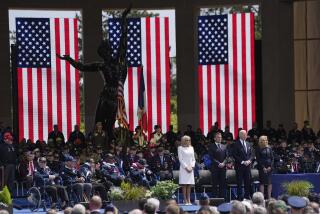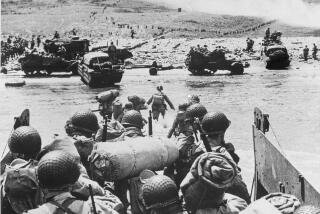HONORING THE HEROES OF THE LONGEST DAY : Exclusion From D-Day Commemorations Rankles Russians : World War II: Omission hurts veterans’ pride. Yeltsin reminds them that no one from West was asked to their remembrances.
- Share via
MOSCOW — True, they did not take part in the D-day invasion.
But Russians’ memories of their tremendous sacrifices during World War II remain so powerful that it could not help but rankle when no representative from Moscow was invited to the grand-scale 50th anniversary celebrations in Normandy.
So badly did the oversight offend, in fact, that President Boris N. Yeltsin took it upon himself to remind his compatriots on national television Monday that if this was a snub, they were guilty of the same rudeness. Russians had not requested their Western allies’ presence at anniversaries of the major Eastern Front battles, including what many historians see as the real turning point of the war, the fight for Stalingrad.
“When we were celebrating the 50th anniversary of the Battle of Moscow, the Kursk Bulge, Stalingrad, etc., we didn’t invite any of our allies at the time, of those who opened the second front,” he said. “However, this does not stop us today from being partners in all affairs.”
Still, the D-day festivities, source of poignant pride for those participating, have elicited mainly hurt pride in Russia--over the lack of an invitation, over the general Western refusal to give the Soviet Union its due in Nazi Germany’s defeat and, beneath it all, over the global loss of fearful respect for the former superpower.
“Only two main participants of those years were not invited--Germany and Russia,” the Rossiyskaya Gazeta commented Saturday. “The former--for clear reasons: It was Germany that was defeated in that war. It’s probably possible to explain why Russia was not invited either: In the presence of those who made the main contribution to the victory, it would be somehow awkward to boast of your battlefield heroics in what was the biggest landing operation of the war--but was only that, an operation, and not the decisive battle of the war.”
Soviet historians, and many Western ones as well, long taught that the real turning point of the war was the Battle of Stalingrad, in which 1.2 million Soviet troops died--more than all the Americans killed during the war.
The entire Soviet death toll is believed to be 20 million people, a loss so devastating that it touched virtually every family. Many Russians still carry a deep grudge against the United States for waiting so long to open the second front; they believe that the delay was intentional and that the West was happy to see its Nazi and Communist enemies destroy each other.
Even the diplomatic Foreign Ministry spokesman, Grigory Karasin, made a point of noting last week that although credit was due Western Allied soldiers, it was Soviet troops who did the most to defeat the Axis powers.
Russian war veterans felt particularly affronted.
“Frankly, I’m offended,” said Sergei Bezverkhy, 73. “If not for us, they would have never managed to land safely. We drew all the best German troops to the Eastern Front while the weakest and least experienced forces remained to guard German positions in the West.
“Americans owe us this victory they wrongly consider theirs,” he said. “A lot of our soldiers’ blood was shed to make D-day possible. They should have invited us any way you look at it.”
Amid the hurt feelings, however, were many conciliatory voices.
Krasnaya Zvezda, the army newspaper, commented that Soviet historians had a tendency to overestimate the Soviet role in the war while Western historians have had a tendency to underestimate it.
Yeltsin said a Russian delegation had been invited to a Normandy town that will be celebrating its liberation on June 28.
And Gen. Dmitri Volkogonov, a distinguished military historian, said that although it would have been better if Russians had been invited, he sees no point in arguing over who did more to win the war.
“I think this is our common victory over fascism,” he said, “and we are not simply Americans, Russians, Brits and Canadians. We are inhabitants of the Planet Earth.”
More to Read
Sign up for Essential California
The most important California stories and recommendations in your inbox every morning.
You may occasionally receive promotional content from the Los Angeles Times.













